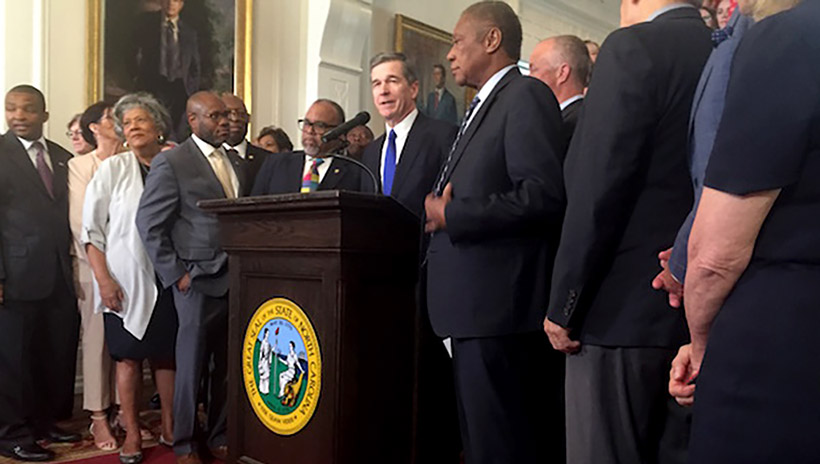Publisher's note: This post appears here courtesy of the Carolina Journal, and written by Dan Way.
Gov. Roy Cooper announces Friday, June 28, that he will veto state budget plan. | Photo: Dan Way
Gov. Roy Cooper has vetoed the
biennial budget bill, saying North Carolina residents are dying because Republicans won't expand Medicaid rolls.
With prospects of budget passage evaporating before the fiscal year ends at midnight June 30, Cooper and Republican lawmakers traded sharp accusations Friday, June 28. They blamed one another for unwillingness to compromise or negotiate seriously.
House Speaker Tim Moore, R-Cleveland, and Senate leader Phil Berger, R-Rockingham, said Republicans plan to take an override vote. The governor claimed Democrats are united and have the votes to sustain his veto.
In the meantime, government agencies and programs won't shut down without a budget. They will continue to operate in the new fiscal year under spending guidelines in the current budget.
"Many are dying because North Carolina has yet to say an important word - Yes," Cooper said, surrounded by Democratic lawmakers, teachers, and health-care professionals during a news conference at the governor's mansion.
"Yes, we will accept Medicaid expansion."
People living on the margins and in the health-care coverage gap - making too much to qualify for Medicaid but not enough to buy private insurance - would be helped by expansion, he said.
But, he said, he wasn't vetoing the $24 billion 2019-20 budget just because it fails to expand
Medicaid.
"This budget is an astonishing failure of common sense and common decency," Cooper said.
"It values corporate tax breaks over classrooms, gimmicks over guaranteed school construction, and political ideology over people."
Cooper distributed side-by-side
comparisons of his budget proposal and the legislature's bill. He railed against corporate tax breaks and education vouchers that give parents school-choice opportunities. He said teachers and state employees should get higher raises.
He said there are $8 billion in unmet school construction needs that would best be addressed with a bonded debt and interest payments. He called the legislative budget approach of using established funds on a pay-as-you-go approach a gimmick to create a slush fund promising projects that might never materialize.
Cooper said Republican lawmakers didn't take his budget priorities seriously. They simply sprinkled some money around, salting some programs without agency requests in the hopes of winning votes for budget passage.
Cooper said he and his staff would pore over the budget next week and submit a compromise proposal the following week. Rather than wait for a special session later this summer, the budget should be completed while lawmakers are still in session, he said.
"Blocking billions of dollars in funding for North Carolina communities less than a day after receiving the budget is a reckless and irresponsible decision by the governor that must be overridden to deliver critical investments in infrastructure, disaster relief, public safety, pay raises, and school construction to our state's citizens," House Speaker Tim Moore, R-Cleveland, said in a press release.
Senate leader Phil Berger, R-Rockingham, held a press conference shortly after Cooper's event. He said he wasn't optimistic Cooper wanted to compromise based on the governor's track record in negotiations. He said Republicans have met with Cooper since mid-June and repeatedly solicited his counter offer - without success.
Berger expects the House to attempt to override Cooper's veto of
House Bill 966. Because the budget bill originated in the House, it would vote first. If successful, the Senate would follow. A three-fifths vote in each chamber is needed to override.
"This is and has always been about Medicaid expansion," Berger said.
"The governor is blocking funds for teacher and state employee raises, the rape kit backlog, the Human Trafficking Commission, and other crucial investments so he can can brag to his far-left base that he vetoed the budget over Medicaid expansion."
He said Medicaid expansion is bad policy because it could blow a large hole in the state budget. Although the federal government would pay 90% of costs initially, it likely will lower that match and shift costs to the state. Cooper wants the state's hospitals to pay the state's 10% match. Berger said those costs would be passed on to patients.
He said 60% of the Medicaid expansion population already qualifies for subsidized insurance plans on the federal health exchange.
Berger said Medicaid expansion is oversold as a solution to rural health-care problems, hospital financial problems, the shortage of health-care providers, and the opioid crisis.
Republicans have been serious about putting together a budget with as many bipartisan votes as possible and included as many elements as possible to avoid a veto, Berger said. He said he's not asked for nor received a pledge from any members to vote for the budget in exchange for including sweeteners.
Senators should vote based on what's best for their districts and constituents, not their parties, he said.
Berger said Cooper wanted Medicaid to be part of a two-track budget process, but has flip-flopped in demanding it be part of the budget compromise.
The Senate can't take up Medicaid expansion this session because of that body's rules, Berger said. Earlier in the session Medicaid expansion was tabled, meaning it was dead for the session. A two-thirds vote would be needed to revive it, but he doesn't think there are enough votes to meet that threshold.
























